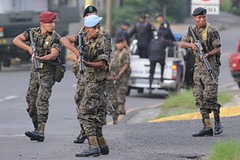
A coup in the Central American nation of Honduras has raised serious questions about what forces are behind the detention of the country's President Manuel Zelaya.
Originally uploaded by Pan-African News Wire File Photos
Zelaya says that the referendum is aimed at making constiutitional changes to help the poor
Manuel Zelaya, the president of Honduras, has been arrested by soldiers after he vowed to go ahead with a controversial referendum on constitutional changes, his allies and local media say.
Zelaya was reportedly arrested at his home on Sunday morning and taken to a military base on the outskirts of the capital, Tegucigalpa.
Al Jazeera's Mariana Sanchez, reporting from Tegucigalpa, said: "An eyewitness told us that between five and six in the morning local time about 100 to 200 soldiers surrounded his home in the centre of the capital and three vans drove up to his home and took him."
"A neighbour said that [the president] came out and the army shot at him, about five shots."
The non-binding referendum, which was due to take place on Sunday, would have asked Hondurans whether they approved of holding a poll on constitutional change alongside general elections in November.
The president fired the armed forces chief of staff last week after he refused to help him organise the vote.
Coup d'etat
The streets of Tegucigalpa were almost empty of traffic on Sunday after reports on local radio urged the city's residents to stay inside.
------------------------------------------------------------------------------
Honduras
Second largest country in Central America
Population of 7.2 million
Second poorest country in the region
Economy forecast to grow less than two per cent this year
Relies on money from Hondurans in the US for more than 25 per cent of its gross domestic product
Former Spanish colony gained independence in 1821
-----------------------------------------------------------------------------------
"We're talking about a coup d'etat," Rafael Alegria, a union leader and ally of Zelaya, told Honduras' radio Cadena de Noticias. "This is regrettable."
The HRN radio station reported that Zelaya had been sent into exile, citing unidentified "trustworthy sources". Other reports suggested that he may have headed to Venezuela.
The supreme court and the attorney-general have said that the vote was is illegal because the constitution bars changes to some of its clauses, such as the ban on a president serving more than one term.
Their decision has been backed by the military and congress.
Colin Harding, an expert in Latin American politics, told Al Jazeera that Zelaya had apparently overestimated his own power in pushing for the referendum.
"He has no support in within his own party, he is opposed by congress, he is opposed by the judiciary and the military, who are not the power they used to be but have lined up against Zelaya ostensibily in defence of legality," he said.
However, many union and farm groups support the referendum, which Zelaya says is aimed at improving the lives for the nearly three-quarters of Hondurans who live in poverty.
Zelaya was elected for a non-renewable four-year term in 2006.
Congress on Thursday approved plans to investigate the president and possibly declare him unfit to govern.
"We have tried to avoid breaching a constitutional order and sidestep a coup," Roberto Micheletti, the congressional president and a member of Zelaya's own Liberal Party, said.
Late on Friday, the president assured the country that the situation "had returned to normality", but he accused members of congress of "conspiracy" and insisted that the armed forces owed him "obedience".
Source: Al Jazeera and agencies
No comments:
Post a Comment